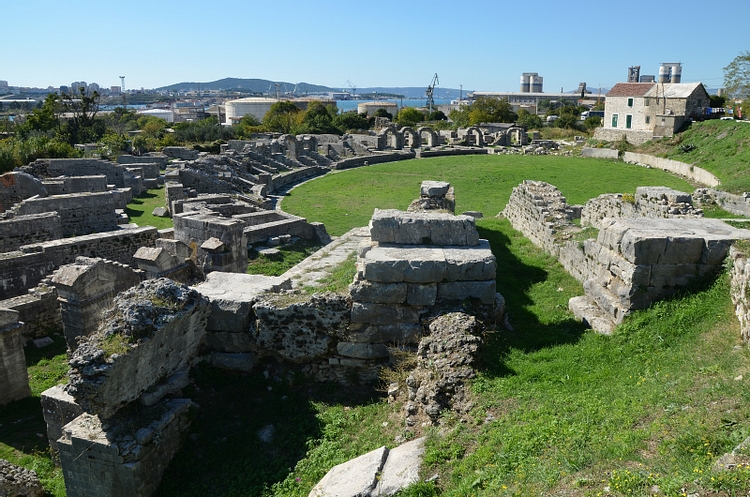
Salona was an ancient city located at the estuary of the river Jadro in present-day Solin, a suburb of Split on the Adriatic coast of Croatia. It became the capital of the Roman province of Dalmatia in 9 CE.
Before the Romans Salona was a settlement of the Dalmatean, an Illyrian people who lived on the shore of the Adriatic. During the 3rd century BCE, Greek colonists from the island of Issa founded an emporium (trade centre) on the coast north of Salona and another one to the south. In 117 BCE the Roman general Metellus Macedonicus invaded Salona and finally in 78 BCE it was permanently conquered. About 33 BCE, during Augustus' reign, Salona became a Roman colony.
A few years later, Augustus conquered the entire region from the Danube to the Adriatic coast. This newly conquered area came to be known as the province of Illyria with Salona as its capital. however, the province was too big and too challenging to be managed by a single governor and, therefore, Augustus decided to split Illyria in two: the southwestern half being named Dalmatia with Salona remaining as its capital. During this time the city flourished and acquired all the characteristics of an important Roman city: defensive walls, a theatre, an amphitheatre for 15,500 spectators and a forum. In 170 CE, during the time of Marcus Aurelius, a new wall enclosing all three sections of the city was built and the population is estimated as around 50,000.
Salona remained Roman for longer than most of the other cities in the western half of the Roman Empire. During the 5th century CE it was home to the governor of Dalmatia, Julius Nepos, the last man entitled to claim the throne of the Western Roman Empire. He was recognized as Emperor of the West for a brief length of time (473-475 CE) but ultimately he was deposed and returned to Salona. He was still accepted as Emperor by some until 480 CE. The city became part of the East Roman Empire and it was given to Theodoric, a Gothic king, in 493 CE. The Emperor Justinian brought Salona back under Roman control in 535 CE; he rebuilt its fortifications and Salona remained one of the key ports of the empire.
Salona is particularly important for the study of early Christian society and architecture. During the 5th and 6th centuries CE a number of churches were built in the city and also basilicas with large cemeteries containing martyrs' burials. In 530 and 533 CE, regional church councils were also held in Salona.

Shortly after this, invading Slav tribes from across the Danube began to threaten the region but they did not reach the Aegean coast. During the rest of the 6th century CE Salona was a fairly secure place but by the beginning of the 7th century CE things had changed rapidly: all over the Balkans, Slav tribes moved freely as a result of the collapse of the frontier defences. Salona resisted for some time but about 614 CE its inhabitants abandoned their homes and fled to Split, where the emperor Diocletian had a palace built for his retirement and which offered a more readily defensible haven.







